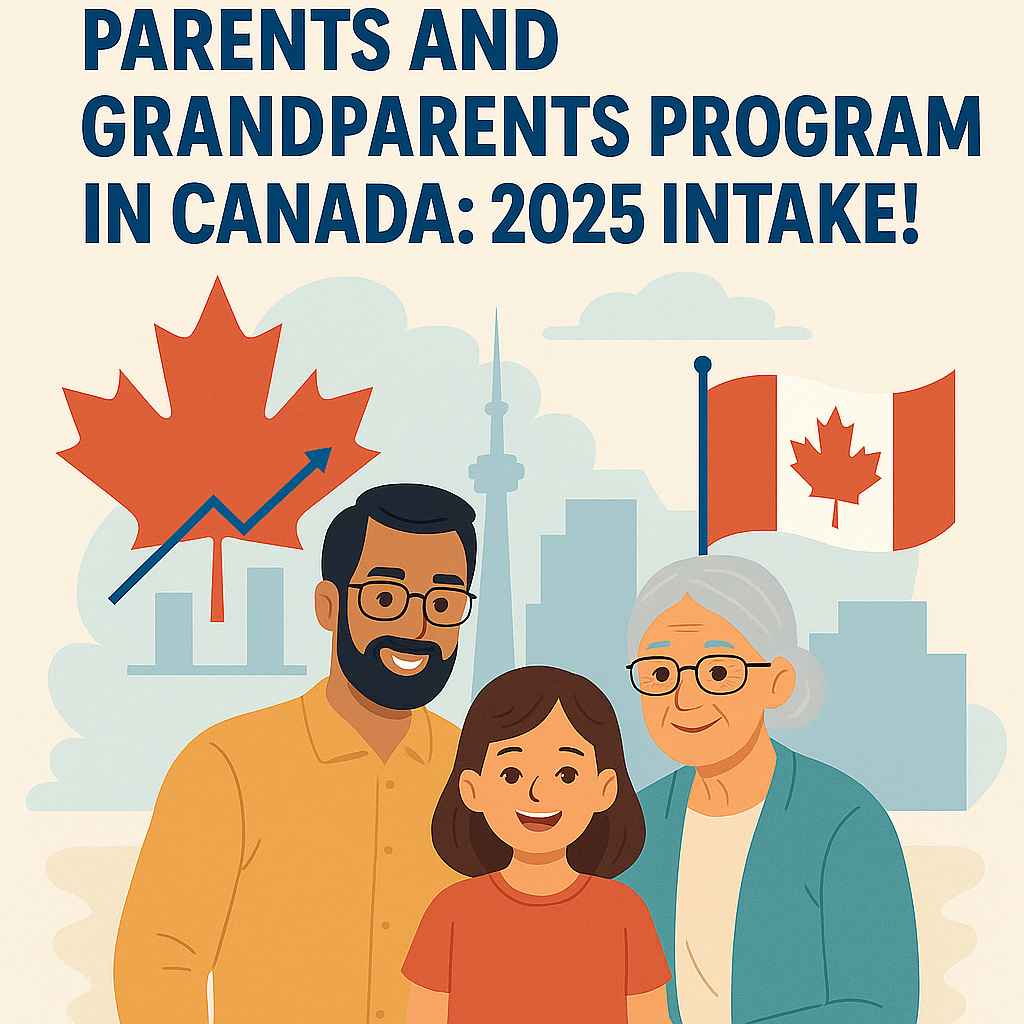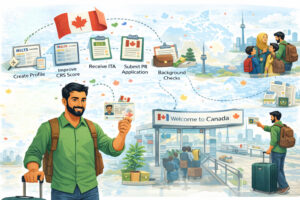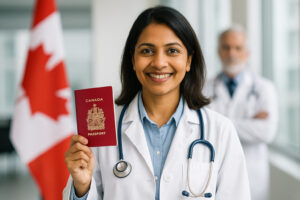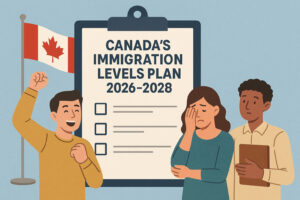What Is The Parents and Grandparents Program?
Canada’s Parents and Grandparents Program (PGP) is a key pillar of the federal immigration system, allowing Canadian citizens and permanent residents to sponsor their parents and grandparents for permanent residency. The government continues to prioritize family reunification, but demand for this program continues to outpace the number of available spots.
A recent IRCC intake report covering 2020 to 2022 provides valuable insights into the selection model, processing outcomes, and application volumes for the Parents and Grandparents Program. In this blog, we’ll break down those findings and bring you the latest update on how the 2025 intake will work.
Understanding the Intake Process (2020–2022)
Between 2020 and 2022, IRCC used a randomized selection system to manage the overwhelming number of applicants. Instead of launching new application windows each year, the department drew applicants from a single pool of 203,213 Interest to Sponsor (ITS) forms submitted in late 2020.
Each year, Invitations to Apply (ITAs) were issued based on this list:
- 2020 intake: 13,400 ITAs issued (6.6% selection rate)
- 2021 intake: 34,500 ITAs (18.2%)
- 2022 intake: 23,100 ITAs (14.9%)
Over the three years, 50,825 complete applications were submitted, just slightly under the combined target of 55,000.
Who Were the Sponsors?
According to IRCC data:
- 53% of sponsors were women
- Most were 31–40 years old
- 73% immigrated under the Economic Class
- 44% lived in Ontario, with 42% in the Western and Prairie provinces
- India was the top country of birth among sponsors (36%), followed by the Philippines and China
Interestingly, 64% of sponsors used a co-signer, often their spouse, to meet income requirements.
Application Processing and Outcomes
As of August 2023:
- 83% of 2020 intake applications had been finalized
- 53% from 2021
- Just 1% from 2022
Across all years, 94% of finalized applications were approved. On average, each application included about 1.8 persons, often the parent or grandparent and their spouse.
Admissions and Backlogs
While the government planned to admit up to 79,000 parents and grandparents between 2020 and 2022, only 49,475 were admitted:
- 2020: 10,461
- 2021: 11,744
- 2022: 27,270
Delays caused by COVID-19, coupled with large inventory backlogs, impacted finalization rates and extended processing times.
What’s Happening in 2025?
March 7, 2025 – IRCC Announcement: This year, IRCC plans to accept up to 10,000 complete applications under the Parents and Grandparents Program, once again drawing from the same 2020 pool of ITS forms. No new forms will be accepted in 2025.
IRCC is expected to begin sending invitations to apply starting July 28, 2025, over a two-week period. Those who submitted an ITS form in 2020 but haven’t yet received an invitation should check their email inbox (and spam folders) for updates.
Applications can be submitted electronically through the Permanent Residence Portal or the Representative Portal.
Current Processing Times (as of February 2025)
- Rest of Canada: ~24 months
- Quebec: ~48 months (due to smaller provincial family class quotas)
IRCC has cited the need to balance intake and processing capacity, especially with the reduced immigration targets introduced in the 2025–2027 Immigration Levels Plan. This means fewer new applications may be accepted until existing inventories are reduced.
Alternative Option – The Super Visa
For families who are not selected under the Parents and Grandparents Program, the Super Visa remains a valuable option. It allows parents and grandparents to:
- Stay in Canada for up to 5 years per visit
- Apply for extensions of up to 2 additional years
- Travel back and forth for up to 10 years
Recent changes have also made the Super Visa more accessible, including updated requirements for health insurance coverage.
Conclusion
The 2020–2022 intake report and 2025 updates together show how demand for parent and grandparent sponsorship continues to outpace available spaces. With a focus on managing backlogs and ensuring timely processing, IRCC is sticking with its randomized draw system, at least for now.
If your family is hoping to reunite in Canada, be sure to:
- Check your email if you submitted an ITS form in 2020
- Explore the Super Visa as a faster, flexible alternative

How does Canada’s Parents and Grandparents Program (PGP) work?
Canada’s PGP allows Canadian citizens and permanent residents to sponsor their parents and grandparents for permanent residency.
How does the intake process for the Parents and Grandparents Program work?
Between 2020 and 2022, IRCC used a randomized selection system to manage applicants. ITAs were issued based on a pool of Interest to Sponsor forms submitted in late 2020.
Who were the sponsors in the Parents and Grandparents Program program?
According to IRCC data, most sponsors were women aged 31-40 who immigrated under the Economic Class, with India being the top country of birth among sponsors.
What were the selection rates for ITAs in the Parents and Grandparents Program program?
In the 2020 intake, 6.6% of applicants received ITAs, while in 2021 and 2022, the selection rates were 18.2% and 14.9% respectively.
What is the approval rate for Parents and Grandparents Program applications?
As of August 2023, 94% of finalized applications were approved, with an average of 1.8 persons per application.
How many parents and grandparents were admitted under the PGP between 2020 and 2022?
While the government planned to admit up to 79,000 parents and grandparents, only 49,475 were admitted due to delays caused by the COVID-19 pandemic.
What is the plan for the 2025 Parents and Grandparents Program intake?
IRCC plans to accept up to 10,000 complete applications under the PGP in 2025, drawing from the same 2020 pool of ITS forms. Invitations to apply are expected to start on July 28, 2025.
What are the current processing times for PGP applications?
Processing times vary, with the rest of Canada averaging around 24 months and Quebec around 48 months due to smaller provincial quotas.
What is the Super Visa and how does it differ from the PGP program?
The Super Visa allows parents and grandparents to stay in Canada for up to 5 years per visit, making it a flexible alternative for families not selected under the PGP.
How can I check my application status for the Parents and Grandparents Program?
If you submitted an ITS form in 2020 but haven’t received an invitation to apply yet, check your email inbox and spam folders for updates.
Can I submit my PGP application electronically?
Yes, applications can be submitted electronically through the Permanent Residence Portal or the Representative Portal.
How can I ensure the timely processing of my PGP application?
Be sure to check for updates on your application status and explore alternative options like the Super Visa for faster reunification with your family.
Can I use a co-signer to meet income requirements for the PGP program?
Yes, 64% of sponsors used a co-signer, often their spouse, to meet income requirements for the PGP program.
What are the application volumes for the PGP program?
Over the three years from 2020 to 2022, 50,825 complete applications were submitted, just slightly under the combined target of 55,000.
How can I get expert support for my PGP or Super Visa application?
If you need help with your sponsorship or Super Visa application, contact me today at https://pcici.ca/consultation for expert support tailored to your family’s needs.




